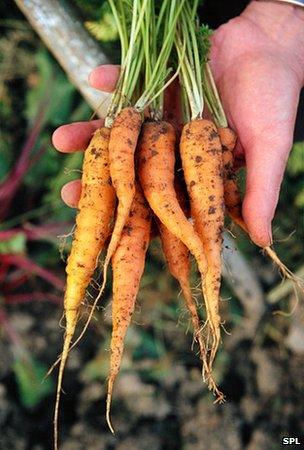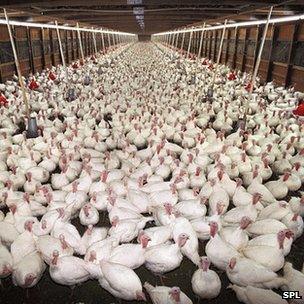Food: Organic growth?
- Published
- comments

Irrigation was one of the factors affecting relative performance of the different crops
The vexed question of whether organic farming offers significant benefits over conventional methods has been raging on for years.
To the outside, it often seems to take place in an environment where entrenched beliefs are more important to some protagonists as evidence.
A paper in the journal Nature, external this week aims to put that right, with a comprehensive and rigorous analysis of studies done on crop yields.
The researchers, from McGill University in Canada and the University of Minnesota in the US, looked for studies that met pretty stiff quality criteria.
To be included, a study had to compare organic and conventional planting across similarly-sized areas, had to report on the sample size and error margins, and had to use organic methods that complied with the guidelines of certification organisations (such as the UK's Soil Association, external).

Organic enthusiasts maintain there are taste advantages as well as boons for wildlife
The headline conclusion is pretty unequivocal; across the board, organic farming produces lower yields than conventional methods, by about 25%.
For fruit, the difference is marginal, just a few percent. But for vegetables, organic yields are about 33% down on conventional, with barley and wheat a little lower still.
There are further differences depending on what type of soil is in play; and there's a steer that some of the enhanced performance of conventional cropping comes through better irrigation.
There's a growing body of evidence showing that in order to provide the extra food needed by the bigger and richer human population of the near future - a doubling of demand by 2050 - without destroying forests and wetlands, farming needs to be made more intensive.
So on the face of it, this latest analysis is a vote for conventional methods above organic.
This would be a slap in the face for people who choose to eat organic food because they believe it's better environmentally - though not for those who choose on the claimed health or taste benefits.
But the fact is that yields are just one aspect of the much larger debate about the farms of the future.
Conventional farming methods using conventional fertilisers are adding active nitrogen to the soil, external, which tends to move to other places - lakes, rivers, seas, the air.
And according to the Planetary Boundaries concept, external, the nitrogen cycle is already one of the places where humanity has already broken through the "safe limit".

Farming systems are about a lot more than yield - welfare, of animals and farmers, is also key
Conventional farming is likely to be harder on insects such as bees - which we know are already in trouble in many countries, partly through use of insecticides that organic farming systems should avoid.
More complex still is the social side of agriculture.
In some countries if not in all, organic farms tend to be smaller than their conventional neighbours.
They're likely to be less mechanised, and to produce goods that command higher prices.
All of which is very good for the social side of agriculture - boosting employment (in the same way that artisanal fishing provides more jobs than the industrial kind), promoting local ownership of land and, in the poorest countries, mitigating against land-grabs.
Just to make things more convoluted, food production and distribution is now an internationalised system.
If Western consumers demand organic food among their imports, is that foisting an inappropriate standard upon growers in poor countries, or is it potentially helping to set better standards for farmers' health and welfare in the exporting country?
It's a rich smorgasbord of issues alright. And yields, as you might say, are not the only fruit.